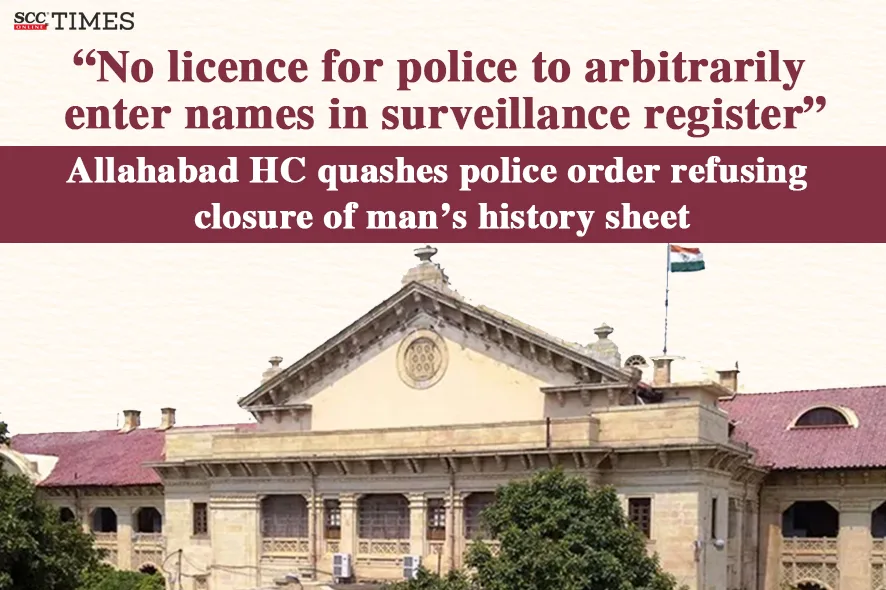Allahabad High Court: In a writ petition filed by an accused seeking quashing of the impugned order passed by the Superintendent of Police, Siddharthnagar (‘SP’), whereby his plea for the closure of his history-sheet was rejected, the Division Bench of Siddharth and Santosh Rai*, JJ., allowed the petition, holding that there was no sufficient ground to entertain a reasonable belief that surveillance was required in the case of the petitioner. There was no evidence to support the act of opening of his history sheet.
Background
The petitioner contended that he had no criminal history except one case registered under Sections 3, 5, and 7 of the U.P. Cow Slaughter Act, 1955 (‘the CS Act’). Previously, the petitioner filed a similar writ petition, but it was disposed of with a direction that he shall file an appropriate application before the SP, and the same shall be considered and decided by the SP. In compliance with the same, the petitioner approached the SP, but vide the impugned order, his representation was rejected based on the report of the Circle Officer, Station House Officer, citing Regulations 228 and 240 of the Uttar Pradesh Police Regulations (‘the Police Regulations’). Hence, this writ petition.
Analysis
At the outset, the Court noted that admittedly, ‘only’ one case had been registered against the petitioner in 2016, which was pending. In the said case, the history sheet no.18 (A category) was approved against only the petitioner out of the five accused.
The Court referred to wherein the Gobind v. State of M.P. (1975) 2 SCC 148, the Supreme Court observed that when a person is subjected to surveillance, the object and limitation of such surveillance depends upon the character and antecedents of the person concerned. The Police Regulation has the force of law and, therefore, it cannot be said to be an infringement of fundamental rights. Nevertheless, Article 21 of the Constitution is a right of an individual to be free from restriction or encroachment directly imposed or indirectly approached by calculated measures.
“We are of the considered view that Regulations 228 and 240 of the UP Police Regulations do not give an unbridled, uncanalised power to the police to use it in such a way that has the necessary consequence of squeezing out the fundamental freedom of the citizen.”
The Court stated that, evidently, the police did not possess a licence to enter the names of whoever they liked or disliked in the surveillance register. Ordinarily, the names of persons with a previous criminal record are entered in the surveillance register. They must be proclaimed offenders, previous convicts, persons who are reasonably believed to be habitual offenders or receivers of stolen property, whether they have been convicted or not, or persons who have already been placed on security for good behaviour.
The Court noted that the petitioner’s representation had very casually been rejected by the SP, citing that Regulations 228 and 240 of the Police Regulations authorised the police to open the history sheet. However, there was nothing to substantiate that the petitioner was involved like the offences envisaged by Regulation 228 (1), i.e., dacoity, burglary, cattle theft, theft from a railway goods wagon, and abettors thereof; there was not even a suspicion by any of the authorities. Therefore, rejection of the representation as well as opening of the history sheet without even looking into the requirement of the Regulations 228 and 240 of the Police Regulation, the impugned order could not be left to stand.
Since the SP opened the history sheet solely based on the case registered under the CS Act, the Court stated that it seemed that the same was done due to the category of cattle theft mentioned under Regulation 228(1) of the Police Regulations. However, the Court stated that since only one case was registered against the petitioner 8 years ago, it could not be said that he was a habitual offender of cattle theft as mentioned in the CS Act.
The Court further noted that Regulation 240 of the Police Regulation provides for the opening of a history sheet based on ‘suspicion’ and based on conviction or acquittal. However, it requires some cogent and reliable material to frame the basis of a reliable and reasonable suspicion.
“We are satisfied that there was no sufficient ground to entertain a reasonable belief that surveillance was required in the case of the petitioner. There exists no evidence to support the opening of the history sheet of the petitioner.”
Accordingly, the Court allowed the writ petition and quashed the impugned order. The Court also directed the respondents to close the history sheet and not to keep surveillance on the petitioner in pursuance of the said history sheet.
[Mohammad Wajir v. State of U.P., 2025 SCC OnLine All 5354, decided on 28-08-2025]
*Order authored by: Justice Santosh Rai
Advocates who appeared in this case:
For the petitioner: Om Prakash Singh Sisodia and Sunil Kumar Singh
For the respondent: Government Advocate


